12 Best Keyword Tools for Google Ads (2025 Review)
12 Best Keyword Tools for Google Ads (2025 Review)
Finding the best keyword tool for Google Ads can feel like searching for a needle in a haystack. You’re drowning in options, each claiming to be the ultimate solution, but which one will actually help you slash your cost-per-click and find those profitable, low-competition terms? Wasting your budget on the wrong keywords is a fast track to a failing campaign, and the right tool is your first line of defense.
This guide cuts through the noise. We're diving deep into the top platforms that will transform your PPC strategy. Before we jump into the tools themselves, it's crucial to have a solid foundation. If you need a refresher, understanding the fundamentals of effective Google Ads keyword research is the perfect starting point for building high-performing campaigns.
Here, you'll find an honest, no-fluff breakdown of each tool. We’ll cover everything from must-have features and real-world use cases to pricing and the honest-to-goodness limitations you need to know about. Forget the marketing jargon; this is a practical resource designed to help you pick the perfect tool for your specific needs, whether you're a freelance PPC pro, part of an in-house team, or a business owner managing your own ads. Let's find the right fit for you.
1. Keywordme
Best For: Streamlining in-platform Google Ads optimization and eliminating manual spreadsheet work.
Keywordme stands out as a powerful and indispensable tool for anyone serious about Google Ads management. Its core strength lies in its seamless integration directly into the Google Ads interface via a Chrome plugin. This fundamentally changes the optimization workflow, transforming tedious, time-consuming tasks into a series of simple clicks. Instead of exporting search term reports to a spreadsheet for manual sorting, filtering, and formatting, you can do it all live within your account.
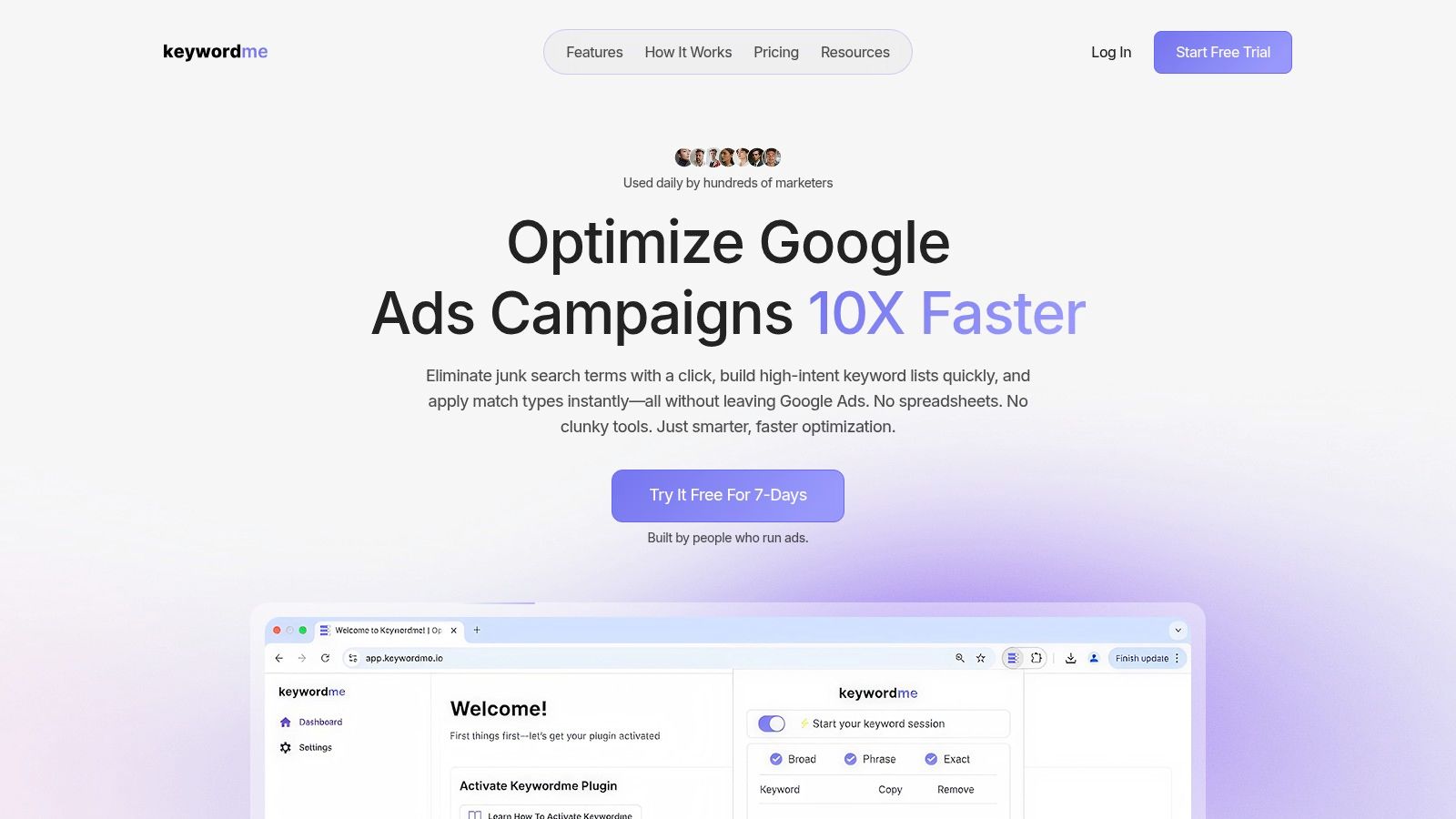
The platform is engineered for speed and efficiency, claiming to boost optimization workflows by up to 10x. Based on hands-on use, this isn't an exaggeration. Building negative keyword lists from irrelevant search terms, applying match types to new keywords, and expanding ad groups with high-performing queries becomes almost instantaneous. This makes it one of the best keyword tools for Google Ads specifically for campaign managers who value speed and precision.
Key Features & Use Cases
- One-Click Negative Keywords: Instantly add wasteful search terms to your negative keyword lists without leaving the search terms report. This is a massive time-saver for daily account maintenance.
- Bulk Match Type Assignment: Select multiple new keywords and apply broad, phrase, or exact match types with a single click, eliminating manual updates.
- Direct Campaign Expansion: Identify a promising search term and add it as a new keyword to an existing or new ad group on the spot, complete with your chosen match type.
- Spreadsheet-Free Workflow: The entire process is handled inside the Ads UI, which drastically reduces the chance of human error from copy-pasting or formatting mistakes.
Why It's Our Top Pick
Keywordme isn't just a research tool; it's an action-oriented optimization powerhouse. While other tools help you find keywords before you launch, Keywordme excels at refining your targeting after you have real-world data. It closes the loop between analysis and implementation faster than any other tool we've tested for in-platform management.
Pro Tip: Use Keywordme during your daily or weekly search term report review. You can clean up an entire campaign's worth of irrelevant traffic and harvest new keyword ideas in the time it would normally take to just download the report.
Pricing & Access
- Pricing: An affordable $12 per user/month. The per-seat pricing can add up for larger teams, but the time saved often provides a clear ROI.
- Trial: A 7-day free trial is available to test the full functionality.
- Support: The platform is backed by an integrated help center and responsive live chat support, making onboarding smooth.
Website: https://www.keywordme.io
2. Google Keyword Planner
You can't talk about the best keyword tool for Google Ads without starting at the source. Google Keyword Planner is the OG, the free-to-use platform built directly into the Google Ads interface. Its biggest advantage is that the data, from search volume to cost-per-click (CPC) estimates, comes straight from Google itself. This makes it an indispensable starting point for any campaign.
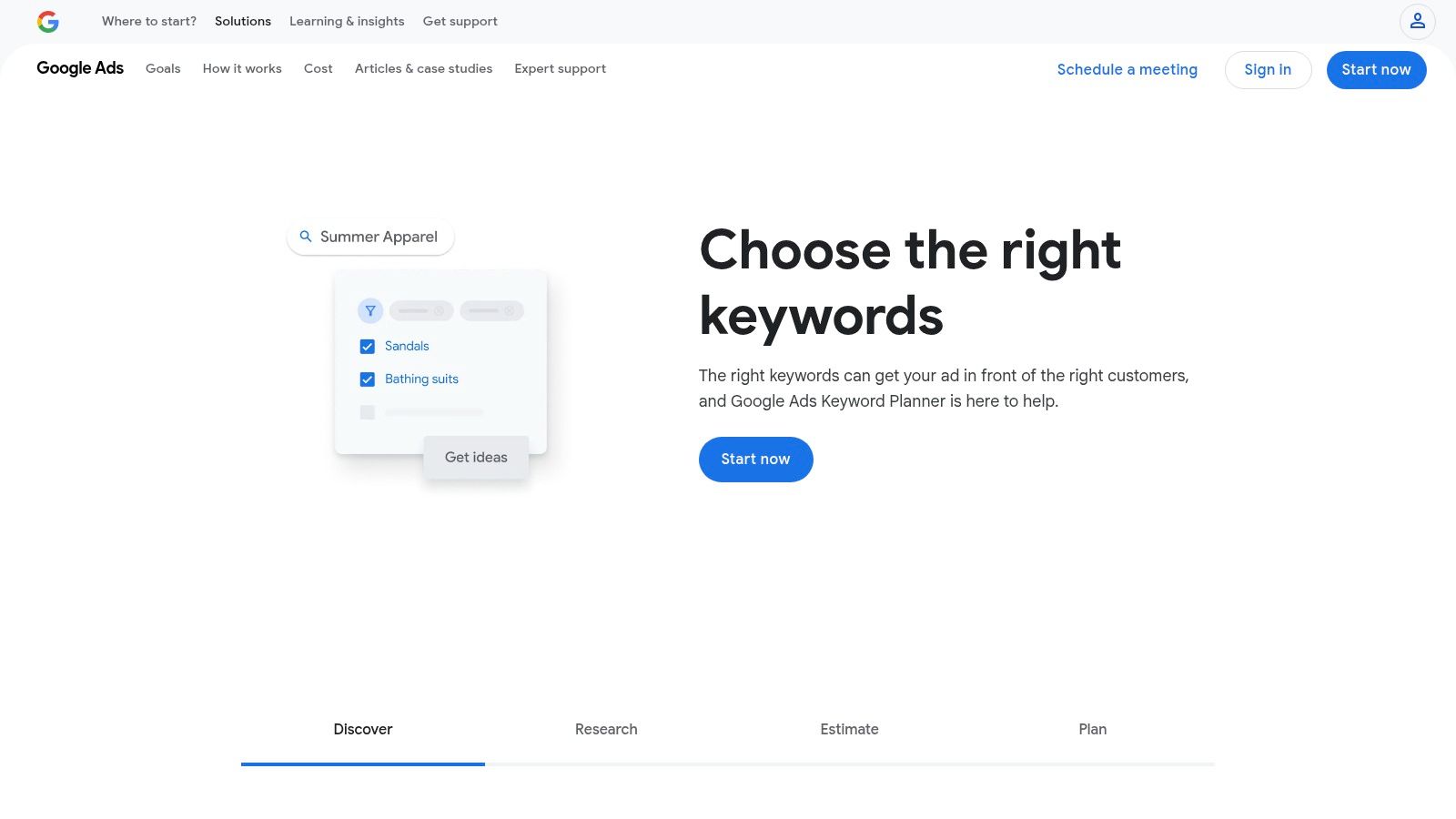
While it might lack the bells and whistles of paid tools, its core functionality is solid. You can discover new keywords based on seed terms or even a competitor's URL, and get historical metrics and forecasts to plan your budget. It's the perfect tool for beginners learning the ropes or for seasoned pros who need a quick, reliable data check.
Why It's a Top Pick
For Google Ads advertisers, using Keyword Planner is a no-brainer. Its direct integration allows you to build a new campaign plan right from your research. You can add keywords to ad groups, set bids, and see estimated performance before spending a dime.
Key Benefit: Because it's integrated with Google Ads, the tool provides forecast data, helping you predict how your chosen keywords might perform for a given budget. It's like a crystal ball for your campaign's potential clicks and conversions.
Pros & Cons
Pros:
- Completely Free: No subscription needed, just an active Google account.
- Authoritative Data: Search volume and bid estimates come directly from the Google ecosystem.
- Seamless Integration: Easily add keywords and build campaign plans directly within Google Ads.
Cons:
- Vague Search Volumes: If you don't have an active, spending campaign, Google provides broad search volume ranges (e.g., 1K-10K) instead of exact numbers.
- Limited Competitive Analysis: It doesn't offer the deep competitor insights that many third-party tools do.
To get the most out of your research, remember that keywords are just one piece of the puzzle. You also need to understand who you're targeting. Learn more about effective audience targeting strategies on the Keywordme blog.
Website: Google Keyword Planner
3. SEMrush Keyword Magic Tool
SEMrush is a heavyweight in the digital marketing world, and its Keyword Magic Tool is a cornerstone of its offering. It’s an all-in-one powerhouse that goes far beyond basic keyword suggestions, making it one of the best keyword tool for Google Ads users who need deep, actionable data. The platform’s strength lies in its massive database of over 25.5 billion keywords and its advanced filtering options.
This isn't just a discovery tool; it's a strategic weapon. You can drill down into keywords by search intent (informational, commercial, transactional), question type, and match type. This level of detail helps you build hyper-targeted ad groups that align perfectly with user needs, improving Quality Score and campaign ROI. While it comes with a steeper learning curve and price tag, the insights are invaluable for competitive markets.
Why It's a Top Pick
For advertisers managing complex campaigns, SEMrush provides a holistic view of the keyword landscape. You can not only find new keyword opportunities but also analyze what your competitors are bidding on, see their ad copy, and uncover gaps in their strategies. This comprehensive competitive analysis is its standout feature, allowing you to outmaneuver others in the auction.
Key Benefit: The advanced filtering and keyword grouping features are a game-changer. You can automatically cluster related terms into ad groups, saving hours of manual work and ensuring your campaign structure is logical and effective from the start.
Pros & Cons
Pros:
- Extensive Keyword Database: Access to one of the largest keyword databases on the market.
- Advanced Filtering Capabilities: Granular filters for search intent, match type, and more.
- Comprehensive Competitor Analysis: Uncover competitor PPC strategies, keywords, and ad copy.
Cons:
- Complex for Beginners: The sheer volume of data and features can be overwhelming for newcomers.
- Higher Cost: It's a premium tool with a subscription fee that reflects its robust capabilities.
The tool’s ability to streamline campaign structure is a huge time-saver. Learn more about how you can automate your keyword research to build campaigns more efficiently.
Website: SEMrush Keyword Magic Tool
4. Ahrefs Keywords Explorer
While many know Ahrefs for its SEO prowess, its Keywords Explorer is an absolute powerhouse for paid search advertisers. It moves beyond simple search volume, offering granular data on how users actually interact with search results. This makes it one of the best keyword tool for Google Ads when you need to understand not just what people search for, but which searches actually lead to clicks on ads.
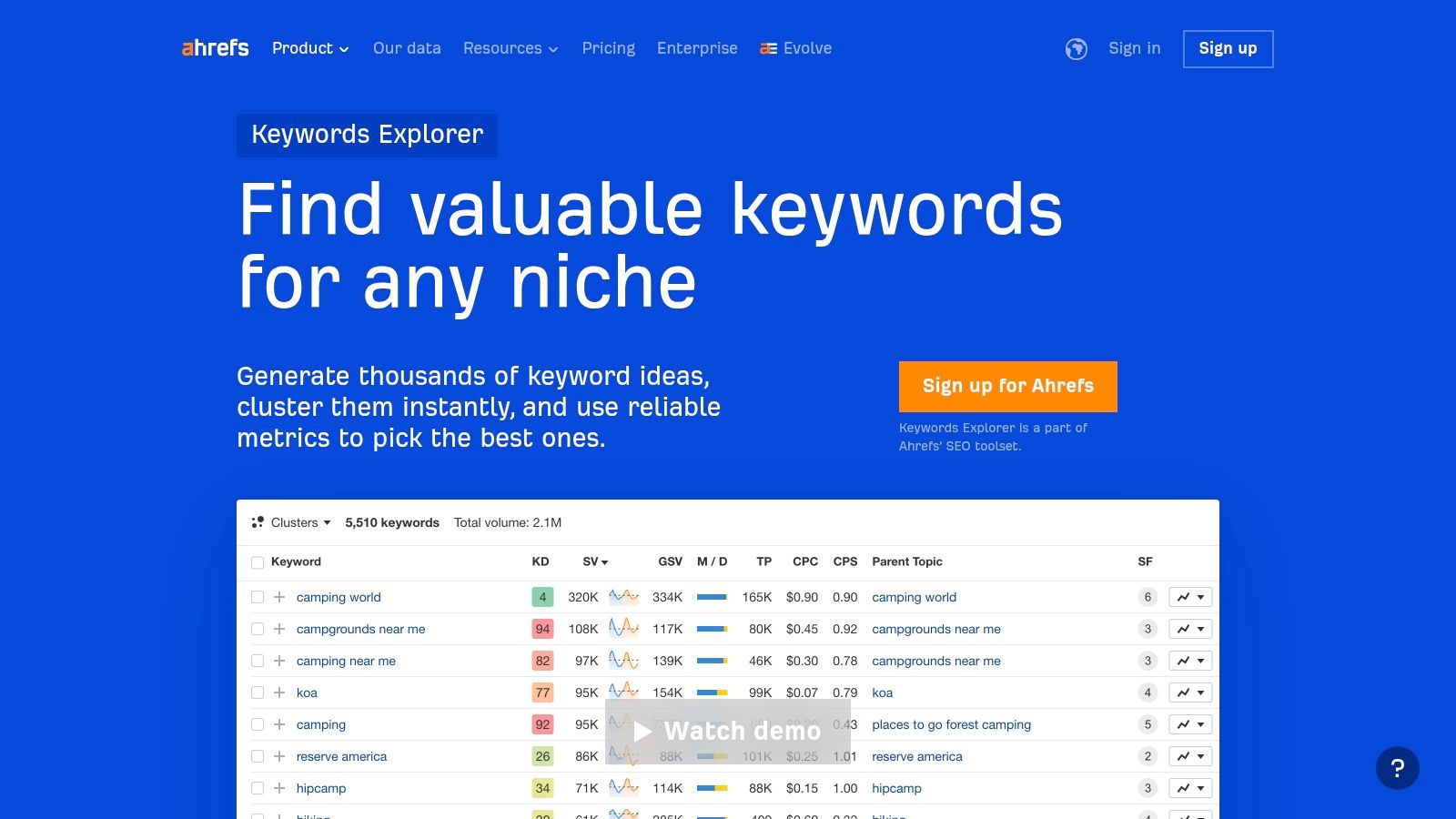
With a massive database of over 1.5 billion keywords, Ahrefs provides metrics you won't find in many other tools, like "Clicks" and "Clicks Per Search." This data helps you identify high-volume keywords where users ignore ads, allowing you to avoid wasting your budget on terms that won't deliver results. It's a tool for advertisers who want to make surgically precise, data-driven decisions.
Why It's a Top Pick
Ahrefs excels at competitive analysis. You can see the exact keywords your competitors are bidding on, the ads they're running, and the landing pages they're using. This insight is invaluable for reverse-engineering successful campaigns and identifying gaps in their strategy that you can exploit. It's a crucial tool for anyone operating in a competitive niche.
Key Benefit: Its unique "Clicks" metric shows how many clicks paid search results get for a keyword. This helps you prioritize terms that actually drive traffic, rather than just impressions, making your ad spend far more efficient.
Pros & Cons
Pros:
- Extensive Keyword Database: Access to a vast and regularly updated library of keywords.
- Advanced Click Metrics: Unique data points like "Clicks" and "Clicks Per Search" provide deeper insights.
- Comprehensive Competitor Analysis: Uncover competitor PPC strategies with incredible detail.
Cons:
- Requires a Paid Subscription: Ahrefs is a premium tool with a price tag to match.
- Steeper Learning Curve: The sheer amount of data and features can be overwhelming for beginners.
Website: Ahrefs Keywords Explorer
5. SpyFu
If you want to reverse-engineer your competitors' Google Ads success, SpyFu is your secret weapon. This competitive intelligence tool is designed specifically for "spying" on what other domains are doing. You can type in any competitor's website and instantly see the keywords they're bidding on, the ad copy they're running, and how much they're spending. It takes the guesswork out of finding profitable keywords.
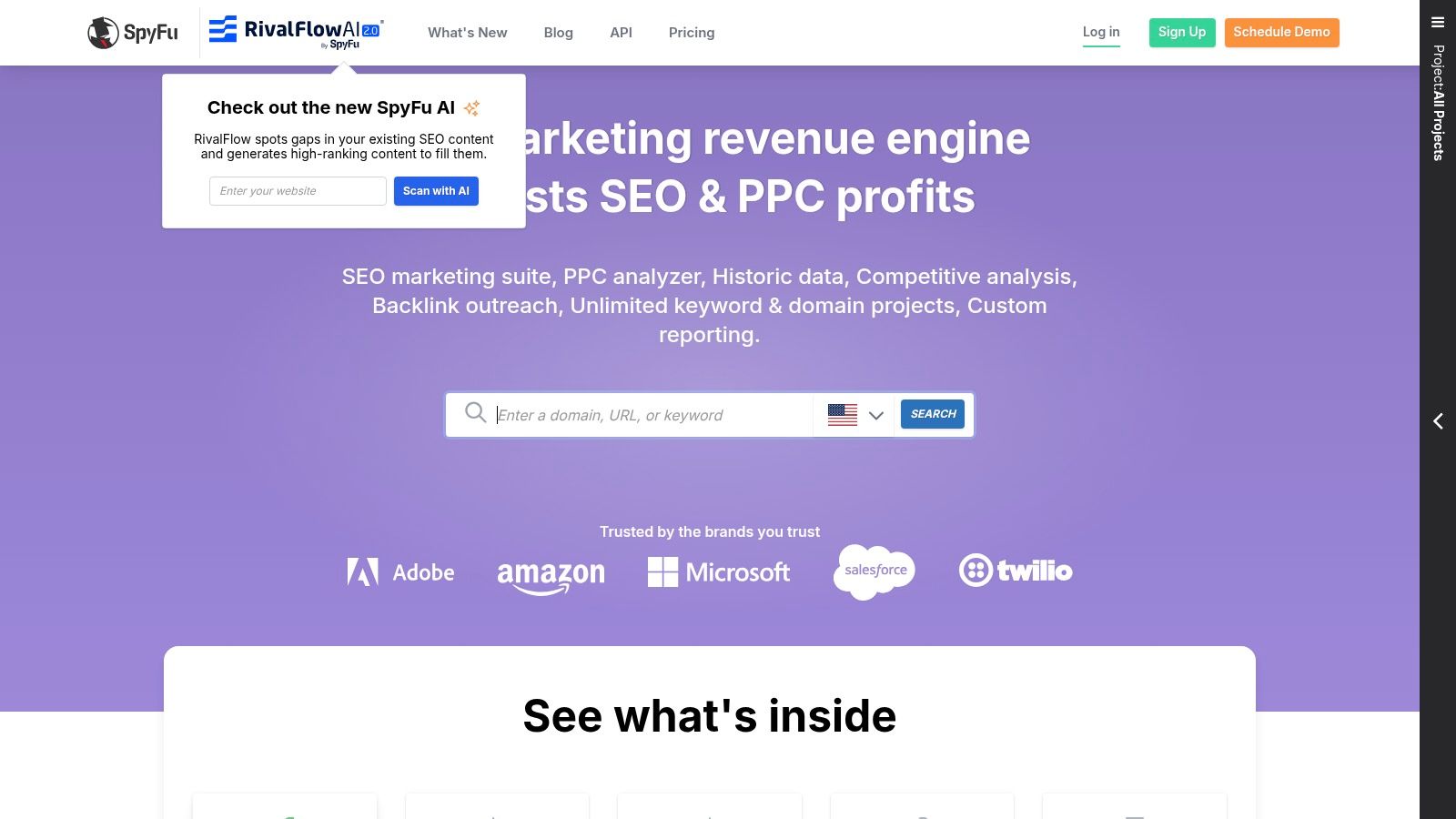
While many tools offer some competitor analysis, SpyFu makes it the main event. It provides a treasure trove of historical data, allowing you to see which ads and keywords have stood the test of time for your rivals. This makes it an exceptional tool for identifying new opportunities and sidestepping the costly mistakes others have already made.
Why It's a Top Pick
SpyFu excels at providing a complete picture of a competitor's PPC strategy. You can see their most profitable keywords and even download a full report. This is invaluable for advertisers entering a new market or trying to gain an edge in a crowded one. It’s arguably the best keyword tool for Google Ads when your primary goal is competitive intelligence.
Key Benefit: Its "PPC Kombat" feature lets you see which keywords you share with competitors and, more importantly, which keywords they rank for that you don't. This is a goldmine for campaign expansion.
Pros & Cons
Pros:
- Focus on competitive analysis: Unmatched depth in competitor PPC keyword and ad copy research.
- Detailed PPC performance metrics: Provides monthly ad spend estimates and click data for any domain.
- Historical ad performance data: See years of ad copy and keyword history to spot long-term trends.
Cons:
- Limited keyword suggestions: Not as robust for generating new keyword ideas from a seed term compared to other tools.
- Requires a paid subscription: While there's a free version with limited data, the core features are behind a paywall.
To get the most value from this tool, you need a solid framework for analyzing your competition. Learn more about how to perform a comprehensive Google Ads competitor analysis on the Keywordme blog.
Website: SpyFu
6. Moz Keyword Explorer
While Moz is often celebrated in the SEO world, its Keyword Explorer is a surprisingly powerful asset for paid search advertisers. Its strength lies in simplifying complex data into actionable insights. The tool offers a clean, user-friendly interface that makes it easy to find valuable terms for your next campaign, even if you're not an SEO guru.
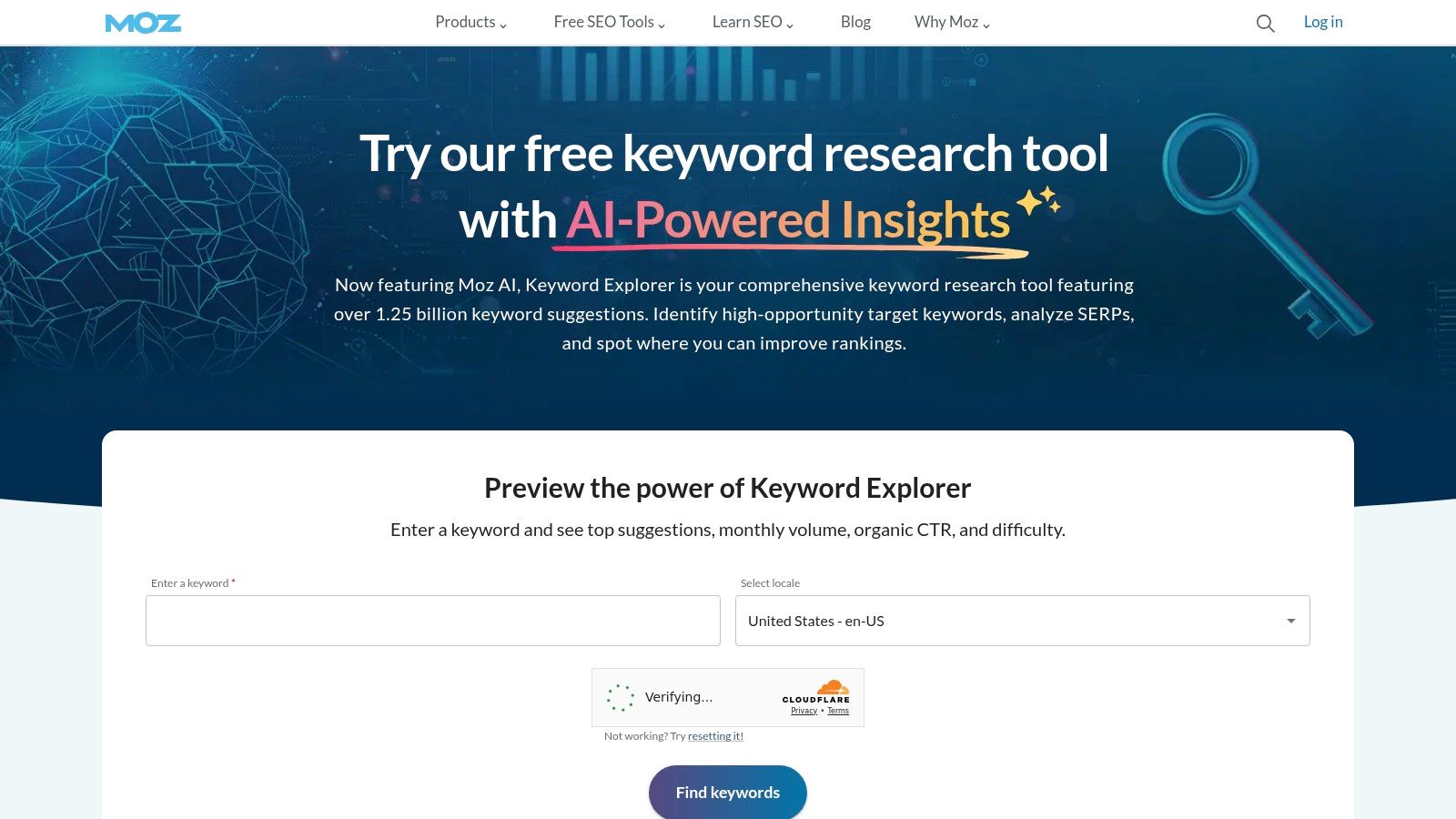
Its real magic is the "Priority Score," a unique metric that balances search volume, difficulty, and organic click-through rate. This helps you quickly identify high-impact keywords that offer the best bang for your buck, a feature that makes it one of the best keyword tool for Google Ads when you need to prioritize your budget effectively.
Why It's a Top Pick
Moz Keyword Explorer excels at providing context beyond simple search volume. By including metrics like organic CTR, it helps you understand which keywords are dominated by organic results, meaning you might need a more aggressive bid strategy to get noticed. This holistic view is crucial for crafting a smart, integrated search strategy.
Key Benefit: The Priority Score is a game-changer. It distills multiple data points into a single, easy-to-understand score, allowing you to instantly spot the keywords with the highest potential and lowest competition.
Pros & Cons
Pros:
- Unique Priority Score: Helps you quickly find keyword opportunities with the best ROI potential.
- Intuitive Interface: Very easy to navigate, making it great for beginners and teams.
- Strong SERP Analysis: Provides insights into the organic landscape for any given keyword.
Cons:
- Primarily SEO-Focused: Some metrics are geared more towards organic search than PPC.
- Limited Free Access: You'll need a paid Moz Pro subscription to unlock its full capabilities.
Website: Moz Keyword Explorer
7. Ubersuggest
Initially known as a free keyword suggestion tool, Ubersuggest has grown into a comprehensive, yet approachable, SEO and PPC platform. It strikes a balance between providing valuable data and maintaining a user-friendly interface, which makes it an excellent choice for beginners or those who find more advanced tools intimidating. The platform offers solid keyword data, including volume and CPC, alongside useful competitive analysis.
Ubersuggest is a fantastic all-in-one option if your Google Ads keyword research is part of a broader digital marketing strategy. You can pull keyword ideas, analyze their PPC potential, and then immediately check out top-ranking content and backlink opportunities for those same terms, all within one dashboard. It's one of the best keyword tool for Google Ads options for marketers wearing multiple hats.
Why It's a Top Pick
Ubersuggest simplifies the keyword research process without sacrificing essential data points. Its visual-first dashboard makes it easy to understand metrics like search volume trends, keyword difficulty, and estimated cost-per-click at a glance. It’s perfect for generating a long list of relevant keywords and quickly vetting them for viability.
Key Benefit: The "Keyword Ideas" report is incredibly useful. It not only provides standard suggestions but also breaks them down into categories like "Questions," "Prepositions," and "Comparisons," giving you immediate insight into user intent.
Pros & Cons
Pros:
- Affordable Pricing: Offers a generous free plan and some of the most budget-friendly paid tiers on the market.
- User-Friendly Interface: Clean, intuitive, and easy to navigate, even for complete beginners.
- All-in-One Features: Combines PPC data with SEO and content marketing tools for a holistic view.
Cons:
- Limited Advanced Features: Lacks the deep, granular filtering and competitive analysis of more specialized PPC tools.
- Data Accuracy: While generally reliable, its data may not be as precise or comprehensive as more expensive competitors.
Website: Ubersuggest
8. WordStream Free Keyword Tool
WordStream has been a household name in the PPC world for years, and their Free Keyword Tool is a testament to their focus on paid search. It's a fantastic, no-fluff option for advertisers who need quick, actionable keyword ideas without getting bogged down by overly complex features. The tool is specifically designed to support Google Ads and Bing Ads campaigns, providing relevant suggestions tailored for performance.
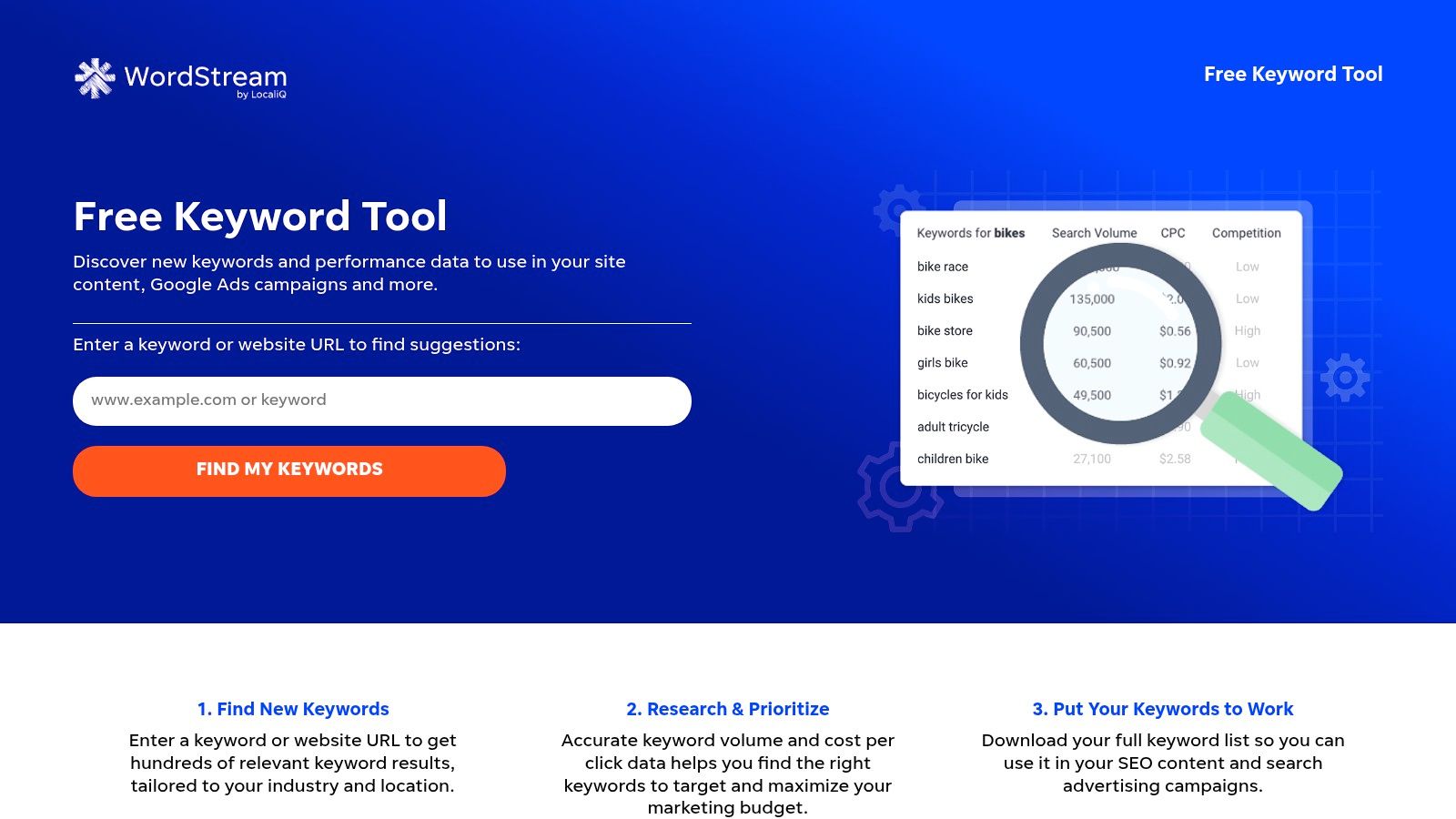
Simply enter a keyword or URL, select your industry and location, and you’ll get a list of keyword ideas complete with search volume, top-of-page bid estimates, and a competition score. It’s a streamlined process that makes it one of the best keyword tool for Google Ads beginners or those needing rapid-fire research.
Why It's a Top Pick
This tool shines with its simplicity and PPC-centric approach. While other tools blend SEO and PPC data, WordStream’s results feel more attuned to the needs of an advertiser. It provides estimated CPCs and competition levels that are directly relevant to building out ad groups.
Key Benefit: Its standout feature is the grouping of keywords by theme, which helps you structure your Google Ads campaigns logically from the very beginning. This saves time and promotes a better Quality Score.
Pros & Cons
Pros:
- Built for PPC: Data and suggestions are specifically tailored for paid search campaigns.
- User-Friendly: The interface is clean, simple, and incredibly easy to navigate.
- Actionable Insights: Provides CPC estimates and competition data to inform your bidding strategy.
Cons:
- Limited Queries: The free version limits the number of searches you can perform.
- Less Comprehensive Data: The data might not be as in-depth or broad as premium, paid alternatives.
Website: WordStream Free Keyword Tool
9. KWFinder by Mangools
If you're looking for a tool that excels at finding low-competition, long-tail keywords without an overwhelming interface, KWFinder is a fantastic choice. Part of the Mangools suite, it’s designed for simplicity and efficiency, helping you quickly identify profitable keywords that your competitors might have missed. Its clean design makes it one of the most user-friendly options on the market.
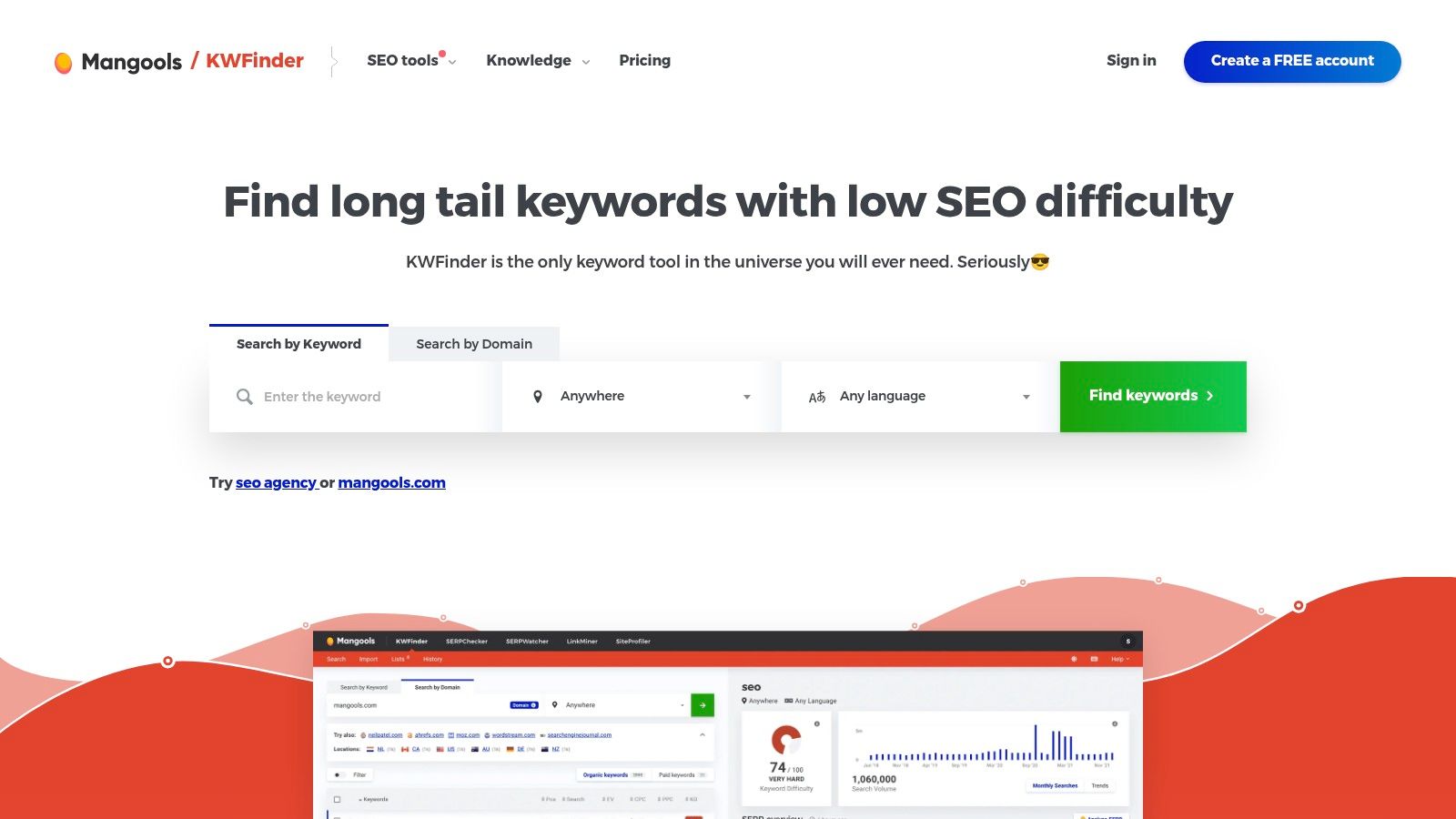
While many tools focus on broad, high-volume terms, KWFinder’s strength lies in uncovering hidden gems. It provides precise search volumes, CPC data, and a unique keyword difficulty score that tells you how hard it will be to rank for a term. This makes it an excellent keyword tool for Google Ads campaigns targeting niche audiences where every dollar counts.
Why It's a Top Pick
KWFinder's standout feature is its keyword difficulty (KD) score, which is presented on a simple 0-100 scale. This metric, combined with SERP analysis data shown right next to the keyword list, gives you an instant, actionable overview. You can quickly filter for keywords with high search volume but low difficulty, creating a powerful strategy for both PPC and SEO.
Key Benefit: The intuitive interface and focus on "easy-to-rank" keywords empower you to build highly targeted ad groups that can achieve lower CPCs and higher conversion rates, avoiding the budget-draining, hyper-competitive keywords.
Pros & Cons
Pros:
- Intuitive Interface: Extremely user-friendly, making it great for beginners and pros alike.
- Excellent for Long-Tail Keywords: Specifically designed to find low-competition opportunities.
- Affordable Pricing: Offers great value as part of the Mangools suite, which includes other useful SEO tools.
Cons:
- Limited Free Version: The free searches are very restricted, pushing you toward a paid plan.
- Lower Search Credits: Compared to some high-end competitors, the number of daily searches can be limited on lower-tier plans.
Website: KWFinder by Mangools
10. Serpstat
Serpstat positions itself as an all-in-one growth hacking tool, and for Google Ads managers, its PPC research features are a goldmine. While many know it for SEO, its ability to analyze competitor ad copy, identify their most profitable keywords, and even reveal their ad examples makes it a potent weapon for crafting campaigns that hit the mark from day one. It bridges the gap between organic and paid search insights.
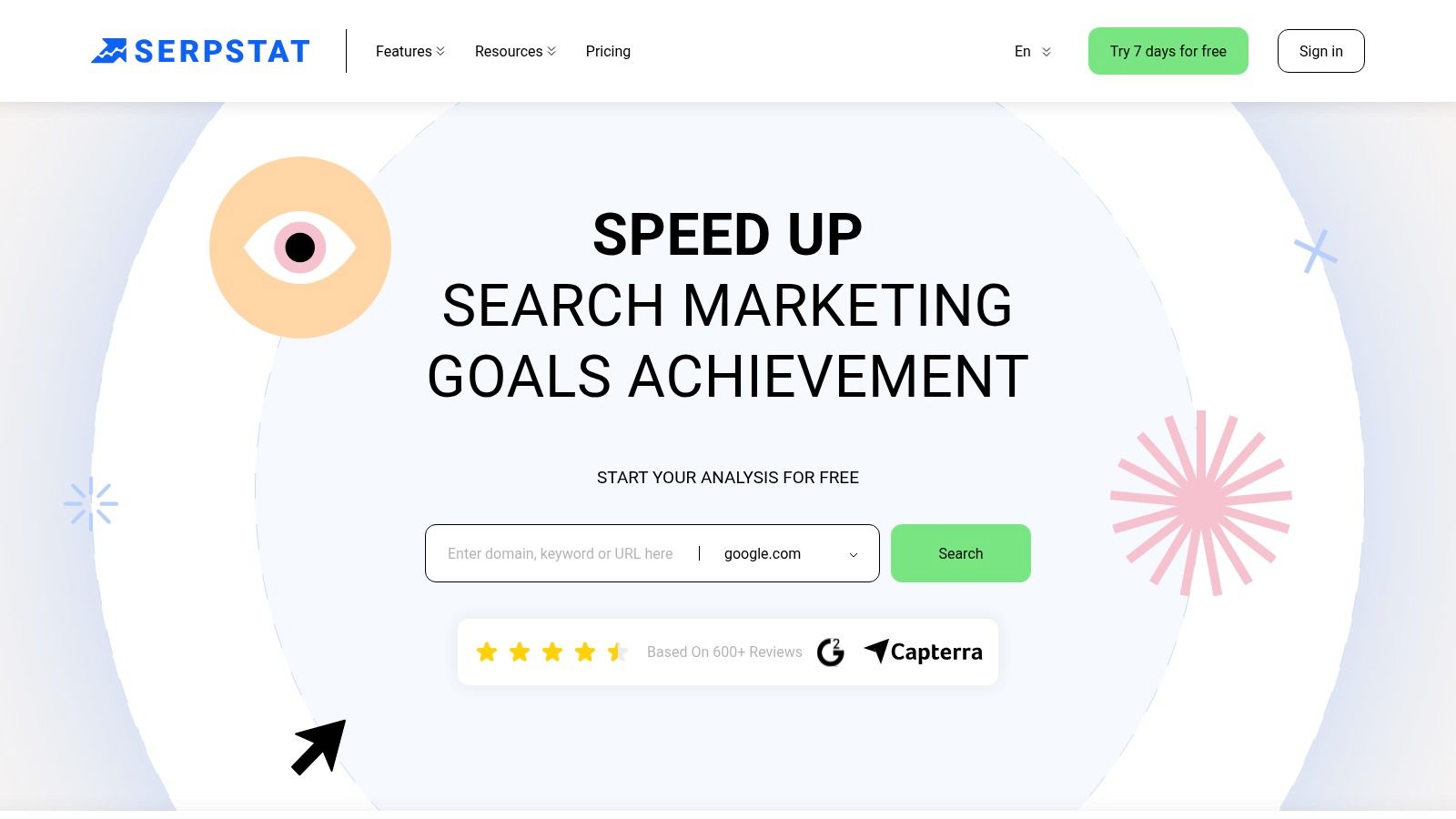
This platform is more than just a keyword finder; it’s a competitive intelligence hub. You can plug in a competitor’s domain and instantly see the keywords they are bidding on, their ad history, and the landing pages they're using. This makes it an incredibly effective tool for reverse-engineering successful campaigns in your niche and finding gaps in their strategy.
Why It's a Top Pick
For advertisers running both SEO and PPC campaigns, Serpstat offers a unified dashboard that saves time and money. Its robust competitor analysis features provide actionable data that goes beyond simple keyword lists, giving you a clear view of the paid advertising landscape. It's an excellent choice for agencies and in-house teams needing a versatile, multi-functional platform.
Key Benefit: Serpstat excels at uncovering "missing keywords," which are terms your direct competitors rank for in the top 10 but you don't. This is a fast track to finding high-value opportunities for your Google Ads campaigns.
Pros & Cons
Pros:
- Affordable All-in-One Tool: Combines PPC, SEO, and content marketing tools at a competitive price point.
- Strong Competitor Analysis: Excellent for deconstructing competitor ad strategies and finding keyword gaps.
- Intuitive Interface: The platform is generally easy to navigate, even with its extensive feature set.
Cons:
- Limits on Cheaper Plans: The entry-level plans have daily search and export limits that power users may find restrictive.
- Slight Learning Curve: While intuitive, mastering all its features can take some time.
Website: Serpstat
11. AnswerThePublic
If you want to get inside your audience's head, AnswerThePublic is your direct line. This tool visualizes the questions people are typing into search engines, making it a goldmine for understanding user intent. Instead of just giving you keywords, it organizes them into intuitive mind maps based on questions (who, what, why), prepositions (for, with, to), and comparisons (vs, and, or).
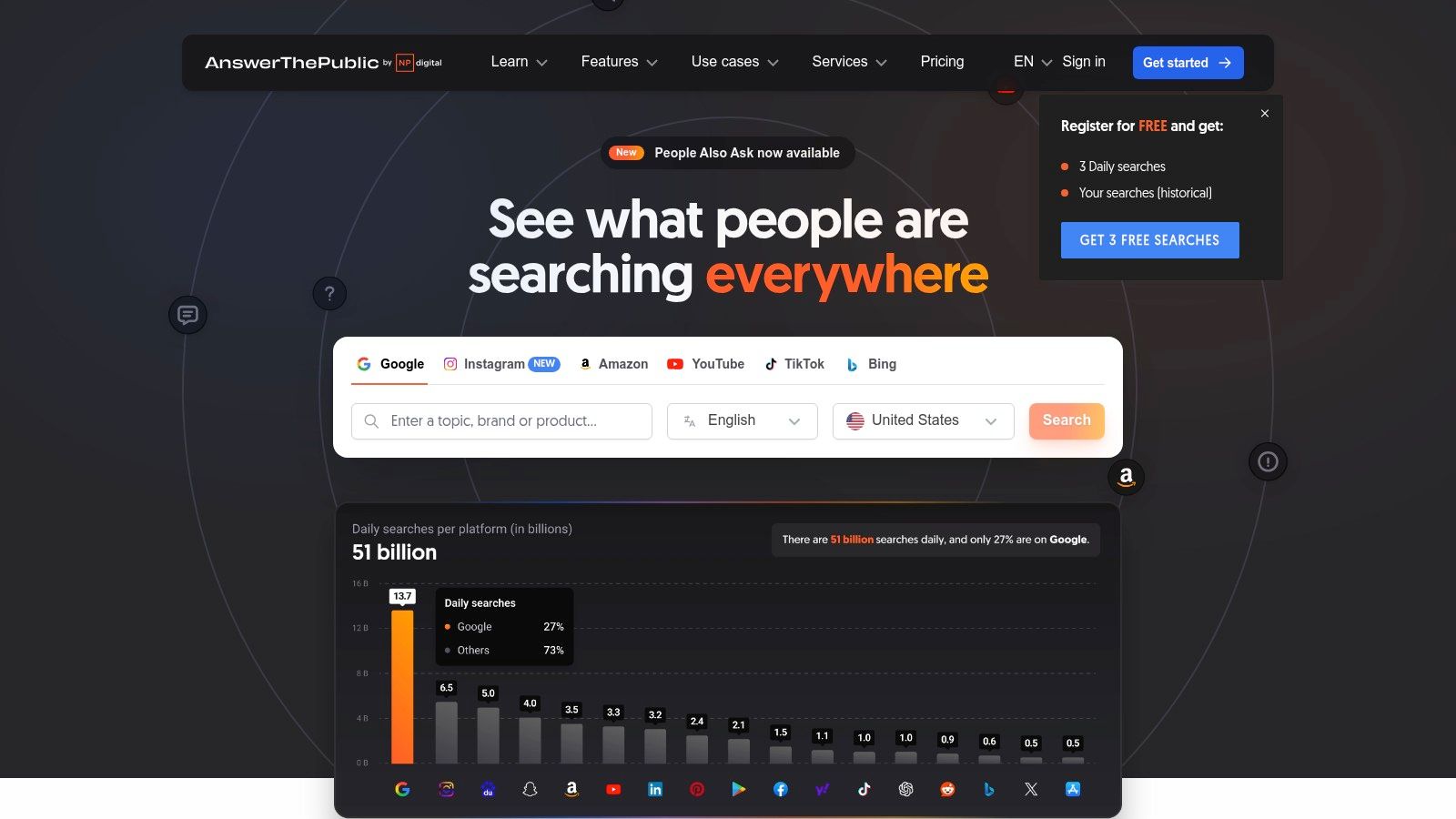
This focus on user queries is perfect for creating high-intent ad groups. By targeting the exact questions your customers ask, you can write ad copy that speaks directly to their needs, leading to higher click-through rates and better Quality Scores. It’s an essential tool for discovering long-tail keywords that other platforms might miss.
Why It's a Top Pick
AnswerThePublic excels at uncovering the "why" behind a search. This makes it an incredibly powerful, and perhaps the best keyword tool for Google Ads when your goal is to create highly relevant ad copy and landing pages. You can build entire campaigns around answering specific customer pain points.
Key Benefit: The unique data visualization helps you quickly spot themes and content gaps. You can see the entire conversation happening around your topic, not just isolated keywords.
Pros & Cons
Pros:
- Focuses on User Intent: Uncovers real questions people are asking.
- Provides Unique Keyword Insights: Great for finding long-tail and question-based keywords.
- Free Version Available: You can run a few searches daily without a subscription.
Cons:
- Limited Free Searches: The free plan has daily usage caps.
- No Volume or CPC Data: It's a keyword idea generator, so you'll need another tool to check metrics.
For a deeper dive into crafting ad copy that converts, check out our guide to writing compelling Google Ads headlines on the Keywordme blog.
Website: AnswerThePublic
12. Keywords Everywhere
For advertisers who live and breathe inside their search browser, Keywords Everywhere is a game-changer. This handy browser extension overlays keyword data directly onto your Google search results page. Forget switching between tabs; you get instant insights on search volume, CPC, and competition for any term you look up, right where you're already working. It’s perfect for on-the-fly research and capturing ideas as they strike.
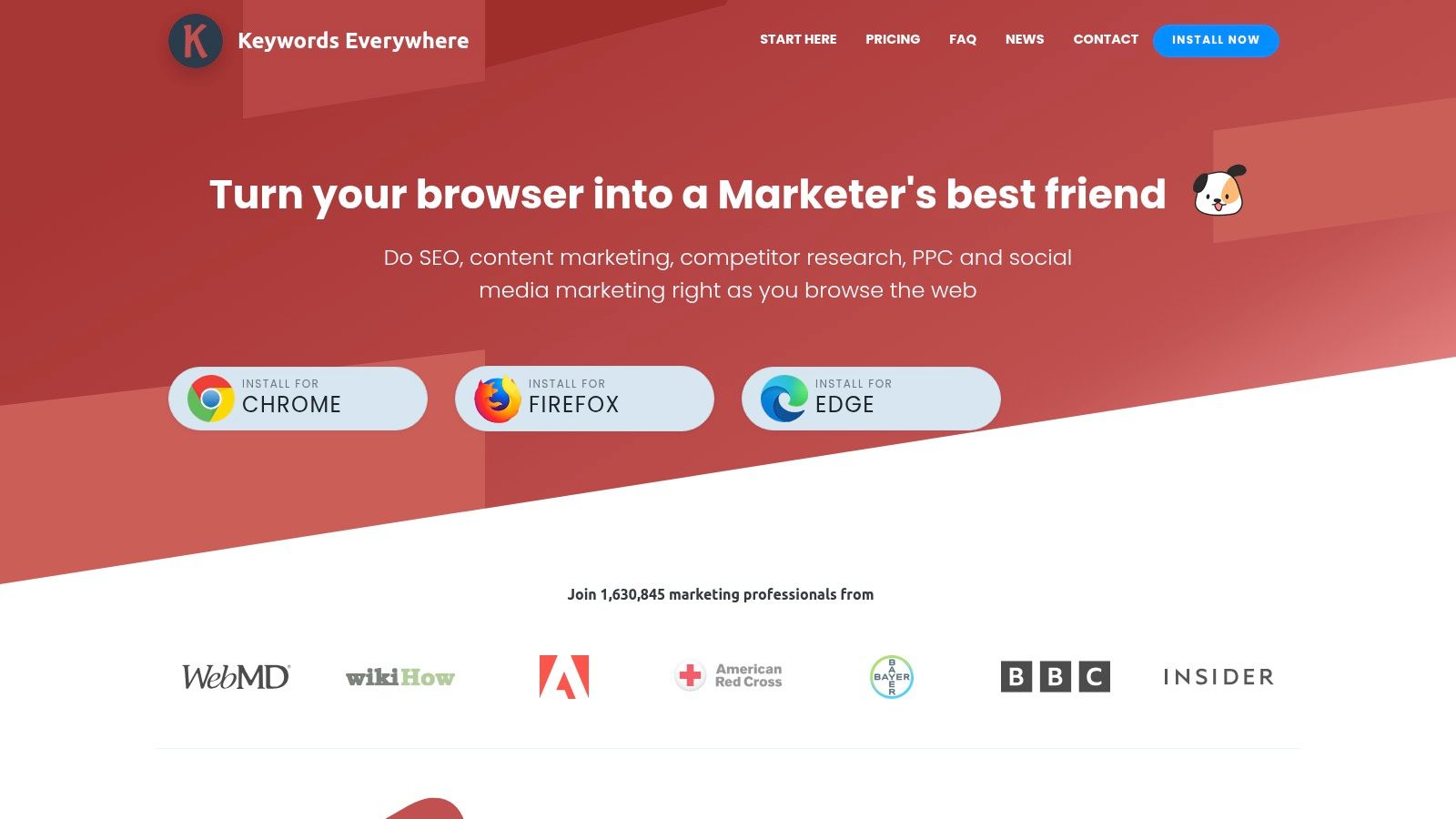
While it started as a free tool, it now operates on a very affordable credit-based system. Its real magic lies in the "People Also Search For" and "Long-Tail Keywords" widgets that appear on the side of your search results. This makes it an exceptional tool for discovering related terms and building out ad groups with highly relevant, lower-competition keywords you might have otherwise missed.
Why It's a Top Pick
Keywords Everywhere removes friction from the keyword research process. Instead of dedicating separate time to open a tool and run reports, the data comes to you. This constant stream of information helps train your brain to think in terms of search data, making you a more intuitive and effective PPC strategist. It's an indispensable, always-on research assistant.
Key Benefit: Its greatest strength is providing contextual keyword data within your natural workflow. Seeing metrics directly in Google search results helps you instantly validate ideas and discover new opportunities without breaking your concentration.
Pros & Cons
Pros:
- Affordable Pricing: The pay-as-you-go credit system is incredibly budget-friendly.
- Seamless Workflow: Provides data directly in the SERP, eliminating the need to switch tools.
- Easy to Use: Simply install the browser extension and you're ready to go.
Cons:
- Limited Advanced Features: Lacks the deep campaign planning and competitor analysis of standalone platforms.
- Requires Credits: Full data access is not free and depends on having purchased credits.
Website: Keywords Everywhere
Top 12 Google Ads Keyword Tools Comparison
Final Thoughts
Whew, we've covered a lot of ground. From powerhouse all-in-one suites like Semrush and Ahrefs to the free, indispensable Google Keyword Planner, it’s clear there’s no single, universally "best" keyword tool for Google Ads. The right choice truly boils down to your specific situation, your budget, and what you’re trying to accomplish with your campaigns. It’s less about finding a magic bullet and more about building a strategic toolkit.
Remember that a great tool is only as good as the strategy behind it. The goal isn't just to find keywords; it's to understand user intent, discover new audience pockets, and outsmart your competition without breaking the bank. Many of the most successful advertisers we know use a combination of tools—maybe Google's planner for initial brainstorming, a competitive analysis tool like SpyFu to see what rivals are bidding on, and a more robust platform for deep-diving into long-tail opportunities.
Your Roadmap to Choosing the Right Tool
So, where do you go from here? Don't get paralyzed by the sheer number of options. Instead, think about your immediate needs and start small.
Here's a simple framework to guide your decision:
- If you're on a tight budget or just starting out: Begin with Google Keyword Planner. It’s the native tool for the platform, and its data, while sometimes broad, comes directly from the source. Complement it with free options like WordStream's tool or the limited version of Ubersuggest to fill in the gaps.
- If you're focused on competitive intelligence: SpyFu is your go-to. Its ability to reverse engineer competitor campaigns is invaluable for finding proven keywords and ad copy ideas you might have missed.
- If you need an all-in-one marketing suite: This is where the heavy hitters like Semrush, Ahrefs, and Moz shine. If your role extends beyond just PPC into SEO, content marketing, and overall digital strategy, investing in one of these platforms is a no-brainer. They provide the comprehensive data needed to see the bigger picture.
- If you need a specialized or user-friendly tool: Platforms like Keywordme and KWFinder are fantastic. They cut through the noise, offering intuitive interfaces and powerful features specifically designed to streamline the keyword research process for PPC without overwhelming you.
Ultimately, finding the best keyword tool for your Google Ads efforts is a journey of experimentation. Take advantage of free trials, test the interfaces, and see which workflow clicks for you. The perfect tool will feel less like a chore and more like a secret weapon, empowering you to build smarter, more profitable campaigns.
Ready to simplify your keyword research and uncover high-intent, low-competition terms that your competitors are missing? Keywordme is built specifically for Google Ads, helping you find profitable keywords in minutes, not hours. Give your campaigns the edge they deserve by signing up for Keywordme today.


.svg)